unit__4职高英语基础模块2unit4课件
unit_4职高英语基础模块2unit4

THNK YOU
汇报人:XX
06
PPT的总结和评价
主题:unit_4职高英语基础模块 2unit4
PPT的总结
特点:注重实用性和可操作性, 适合职高学生使用
添加标题
添加标题
添加标题
添加标题
内容:包括词汇、语法、阅读、 写作等方面的知识
评价:内容丰富,讲解清晰,易 于理解,有助于提高学生的英语 水平
PPT的评价和建议
内容丰富,逻辑清晰 设计美观,色彩搭配合理 动画效果适当,不喧宾夺主 建议增加互动环节,提高观众参与度 建议在关键信息处添加标注,便于观众理解 建议对PPT进行定期更新,保持内容的新鲜度和时效性
路径动画:让元素沿着 特定路径移动
缩放动画:让元素进行 缩放
颜色动画:让元素进行 颜色变化
动画触发器:设置动画 的触发条件,如点击、
鼠标悬停等
进入动画:让元素以各 种方式进入PPT
退出动画:让元素以各 种方式退出PPT
旋转动画:让元素进行 旋转
动画效果选项:调整动 画的速度、延迟、重复
等参数
透明度动画:让元素进 行透明度变化
结论:总结 PPT的制作 和演示技巧, 强调PPT在 职高英语教 学中的应用 和重要性
各章节的主题和内容
第一章:介绍PPT的基本概念和 用途
第三章:分析PPT
添加标题
添加标题
第二章:讲解PPT的制作过程和 技巧
第四章:探讨PPT在实际工作中 的应用和价值
03
unit_4职高英语基础模块 2unit4.ppt
汇报人:XX
目录
01 P P T 的 标 题 和 内 容 概 述 02 P P T 的 章 节 和 主 题 03 P P T 的 布 局 和 设 计 04 P P T 的 动 画 和 交 互 05 P P T 的 演 示 和 讲 解 06 P P T 的 总 结 和 评 价
外研社2024新标准职业英语综合教程2教学课件Unit_4_.pptx__Unit_4

Background information about Peter
His main job is to 1. respond to customer emails.
He started this job 2. three years
ago.
The beginning It was a total mess.
Text
Vocabulary
Understanding ideas
Developing skills
Using language
译文
① “If only I had known that empathy was going to work so well with customers, I would’ve started using it a long time ago,” Peter told his new colleague at coffee corner.
• write a response email to customer complaints.
Learning Context
Communicative scenario
As a sales support specialist, your job is to respond to overseas customers’ concerns and complaints via email. Yesterday, you received an email from an online buyer, Sofia. She complained that she did not receive the birthday gift she had bought for her son from your company. You are going to write a response email. In this email, you will first show your understanding of her situation and then provre him
中职英语高教版(2021)基础模块2《 Unit4 Volunteer Work》课件
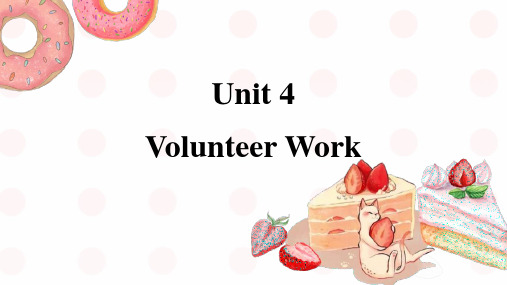
eg. She volunteered the information. 她自动提供了这一消息。
2. graduate v.毕业 graduation n.毕业 graduate from 毕业于
8.In Unit 1,we learned how to introduce____.
A . ourselves Be may need your help____ some business matters .
A . to
B . in
C . for
B
3) visit the elderly in a
E
nursing home
4) be a teacher in rural areas
C
5) plant trees on a hill
F
6) protect animals
Think and talk: 根据兴趣,与同伴谈论适合自己的志愿活动。
A . to
B . for
C . with D . in
6.Please inform them____ the time of the meeting.
A . to
B . of
C . with D . in
7.She is good____.
A . to writing B . at writting C . at writing D . in writting
You may ask
What kind of volunteer work do you want to do?
高教版中职英语(2021)基础模块2第4单元《Volunteer+Work+Words(1)》课件
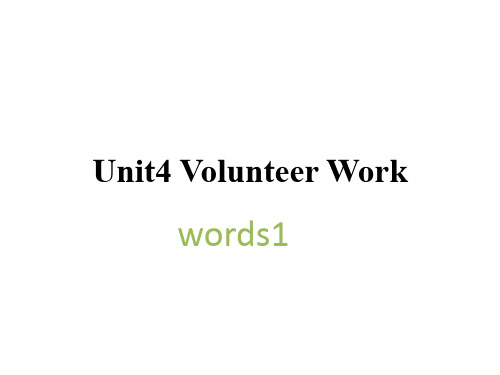
contribute /kənˈtrɪbjuːt/ v. 做出贡献 的
department /dɪˈpɑːtmənt/ n. 部门
result /rɪˈzʌlt/ n. 结果
electronic /ɪˌlekˈtrɒnɪk/ adj. 电子的 rural /ˈrʊərəl/ adj. 农村的
enthusiastic /ɪnˌθjuːziˈæstɪk/ adj. 热心的university /ˌjuːnɪˈvɜːsəti/ n. 大学
architecture /ˈɑːkɪtektʃə(r)/
n. 建筑 architect /ˈɑːkɪtekt/ n. 建筑师
赫尔佐格 皮埃尔·德梅隆
李兴刚
beach /biːtʃ/ n. 海滩
collect /kəˈlekt/ v. 收集
collection /kəˈlekʃ(ə)n/
n. 收集品,收藏
adj. 电子的
electric /iˈlek.trɪk/
adj. 电动的
If you are interested and enthusiastic, fill in the electronic application form online. 如果你有兴趣,有激情,请在网上填写电子申请表。
I want to buy an electric car. 我想买一辆电动车。
activity /ækˈtɪvəti/ n. 活动
amazing /əˈmeɪzɪŋ/ adj. 令人惊奇的
application /ˌæplɪˈkeɪʃn/ n. 申请
organization /ˌɔːɡənaɪˈzeɪʃn/ n. 组织
apply /əˈplaɪ/ v. 申请
中职英语第二册unit4 volunteers课件
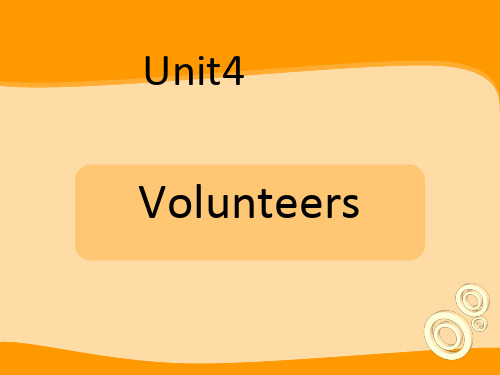
Volunteers
Do you know the word of volunteer?
The definition of volunteer is : Someone who offers his or her services freely.
Step1 warming up
Look at the following pictures and talk about them with your partner.
volunteer teachers
Step1 warming up
Look at the following pictures and talk about them with your partner.
volunteer students
Step1 warming up
Look at the following pictures and talk about them with your partner.
the first volunteers to enter two of the disaster zones in Wenchuan earthquake on May 12,2008.
• ( )2 Chen Yan serves as a volunteer only in Wenchuan
eaFrthquake .
_e_n_vi_ro_n_m_en_t _pr_o_te_ct_io_n ___and __m_aj_or_s_oc_ia_l _ev_e_nt_s ___.
3)Helping others out of troubles is __f_ar_m_o_re_r_ew_a_rd_in_g________than anything else.
中职英语高教版2021基础模块2 Part5 Unit4 Volunteer Work课件
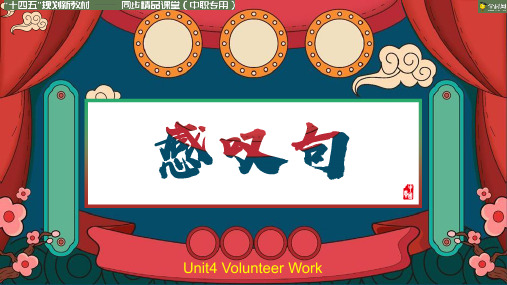
apply
3)_re__s_p_o__n_s_i_b_l_e_. I am good at communication and 4)_o_r_g_a_n__iz__a_t_io__n_. I like outdoor sports and I am a member of the Hiking Club in my school. Last year, I
选择合适的短语,用其适当形式补全句子。
●major in ●home and abroad ●act as ●look forward to ●be skilled in
1)The products of the company sell well both at_h_o__m__e__a_n__d__a_b_r_o_a__d__. 2)The students_l_o_o__k_f_o__r_w_a__rd___to__the opportunity to do some volunteer work. 3)I like history and I will__m__a_j_o_r__in__History in college. 4)A trained dog can_a_c_t__a_s_a guide to blind people. 5)If you want to be a cook in that restaurant, you'd better__b_e__s_k_i_l_le_d___in___ Western cooking.
感叹句
口诀
去主谓,定末尾; 名用what,形副how; a,an出现注意到: 形名相连选用what, 形名相隔就用how。
1._W__h_a__t_beautiful hats they are! 2._W__h_a__t_fine weather it is! 3._H__o_w___fast the horse runs! 4._W__h_a__t_a tall boy he is ! 5._H__o_w___tall a boy he is!
中职英语基础模块2 Unit 4 I've tried all the means of transportation PPT
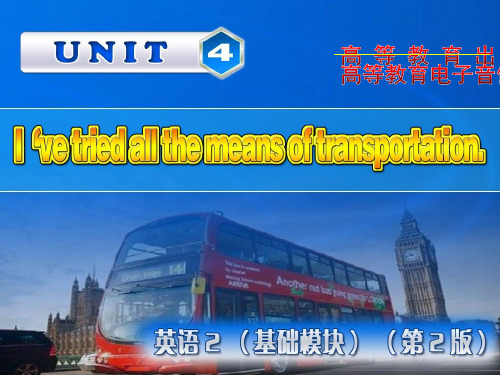
5. Listen and complete. 再听录音,并填写Sara的观点
Public Transportation in Shanghai
Sara’s Opinion
Subway
comfortable
Light rail
fast
Taxi
A bit expensive, but the service was very good.
taxi
plane
train
light rail
bus
boat
• 四单元录音材料 • Tang Hua: Hi, Sara! How was your holiday? • Sara: Great! I have just come back from my trip to Shanghai. • Tang Hua: Did you go there by air? • Sara: Oh no, I went there by train. • Tang Hua: Have you ever been to Shanghai before? • Sara: Yes, I have been there three times. • Tang Hua: What is the transportation like in Shanghai? • Sara: It has changed a lot since 1999. Shanghai has built more light rails
6. Listen and underline.
Bob: It’s good. The transportation in Beijing has changed a lot. There are more subways and light rails.
中职英语基础模块2unit4课件 外研版
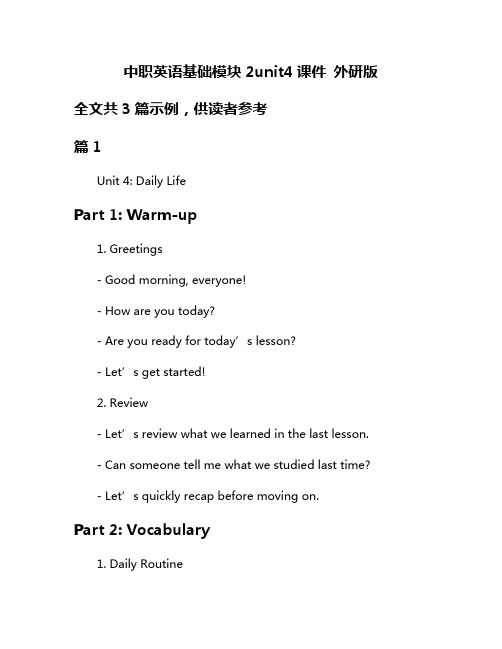
中职英语基础模块2unit4课件外研版全文共3篇示例,供读者参考篇1Unit 4: Daily LifePart 1: Warm-up1. Greetings- Good morning, everyone!- How are you today?- Are you ready for today’s lesson?- Let’s get started!2. Review- Let’s review what we learned in the last lesson.- Can someone tell me what we studied last time?- Let’s quickly recap before moving on.Part 2: Vocabulary1. Daily Routine- Brush teeth- Wash face- Have breakfast- Go to work/school- Have lunch- Do homework/study- Have dinner- Take a shower- Go to bed2. Expressions- What time is it?- What’s the date today?- Have a good day!- Good night!- See you later!Part 3: Listening Practice1. Listening Comprehension- Listen to the audio and answer the questions.- Pay attention to the keywords and try to understand the main ideas.2. Dialogue Practice- Work with a partner to practice the dialogues.- Pay attention to pronunciation and intonation.Part 4: Grammar1. Present Simple Tense- I brush my teeth every morning.- She goes to work by bus.- We have dinner at 7 o’clock.- They study English on weekends.2. Time Expressions- Every day/week/month- In the morning/afternoon/evening- At 6 o’clock/12 noon/midnight- On Monday/Tuesday/FridayPart 5: Speaking Practice1. Interview Activity- Interview a classmate about their daily routine.- Take notes and share with the class.2. Role Play- Act out a typical day in your life.- Use the vocabulary and expressions we’ve learned. Part 6: Writing Task1. Daily Journal- Write a journal entry about your day.- Include details about your routine and any special events.2. Email Writing- Write an email to a friend describing what you did today.- Use the present simple tense and time expressions. Part 7: Review Game1. Daily Life Quiz- Test your knowledge with a fun quiz.- Earn points for correct answers and compete with your classmates.2. Wrap-up- That’s all for today’s lesson. Well done, everyone!- Remember to practice what we’ve learned and review for the next class.- See you next time! Have a great day!篇2Unit 4: Making PlansPart 1: VocabularyIn this unit, we will learn some vocabulary related to making plans. Let's start with some common words and phrases:1. Arrange: to make plans or preparations for somethingExample: We need to arrange a meeting to discuss the project.2. Schedule: a plan that shows the times that events will happen or the things that people have to doExample: What's your schedule for tomorrow?3. Confirm: to say or show that something is true or correctExample: Please confirm your attendance at the meeting.4. Reschedule: to set a new time or date for something that has been plannedExample: We had to reschedule the meeting for next week.5. Postpone: to arrange for something to happen at a later time than originally plannedExample: The concert has been postponed due to bad weather.6. Cancel: to decide that an event will not happenExample: The workshop has been canceled due to low attendance.Part 2: GrammarIn this unit, we will also learn some grammar structures used for making plans. Let's look at a few examples:1. Present Continuous for Future ArrangementsWe use the present continuous tense to talk about future plans that are already fixed or arranged.Example: I'm meeting Sarah for lunch tomorrow.2. Going To for Future PlansWe use "going to" to talk about future plans that we have already decided or intend to do.Example: I'm going to study abroad next year.3. Will for Future DecisionsWe use "will" to make decisions at the moment of speaking.Example: I'll call you when I arrive.Part 3: Speaking PracticeNow, let's practice making plans using the vocabulary and grammar structures we have learned in this unit. Here are some conversation prompts to help you get started:1. What are your plans for this weekend?2. Have you arranged your schedule for next week?3. Are you going to attend the party on Saturday?4. Do you need to reschedule our meeting?5. Will you confirm your attendance at the event?Remember to use the vocabulary and grammar structures we have learned to communicate effectively when making plans. Good luck!篇3Unit 4 of the Basic Module 2 of Vocational English in the New Foreign Version covers a variety of topics related to work and employment. In this unit, students will learn how to describe job responsibilities, discuss career goals, and understand workplace etiquette.The unit begins with a discussion on different types of jobs and industries, helping students expand their vocabulary related to work. They will learn common job titles and descriptions, as well as the skills and qualifications needed for various professions.Next, students will explore the concept of job responsibilities and how to effectively communicate these to others. They will practice using modal verbs to express obligations and duties in the workplace, as well as discuss the importance of teamwork and collaboration in achieving common goals.Following this, the unit delves into the topic of career goals and aspirations. Students will learn how to talk about theirlong-term career objectives and the steps they need to take to achieve them. They will also discuss the importance of continuous learning and professional development in pursuing a successful career.Additionally, the unit covers workplace etiquette and professional communication. Students will learn how to communicate effectively with colleagues and supervisors, as well as handle conflicts and feedback in a constructive manner. They will also explore the dos and don'ts of office conduct, including appropriate dress code and email etiquette.Overall, Unit 4 of the Basic Module 2 of Vocational English in the New Foreign Version provides students with the necessary language skills and cultural awareness to succeed in the modern workplace. By mastering the concepts and practicing the language exercises in this unit, students will be better equipped to navigate the complexities of the professional world and achieve their career goals.。
职高英语基础模块下册unit4TV and internet.ppt
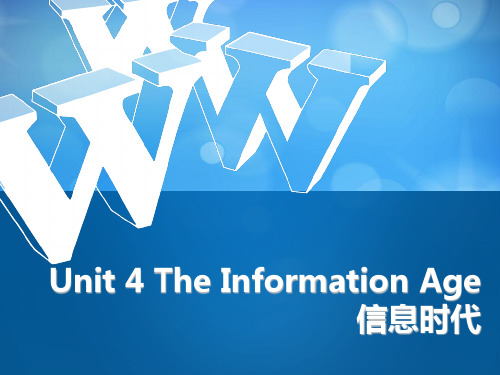
炎热的天气还要持续一段时间。P来自ge 15Reading
Part2(para.2-3)---The advantage and disadvantage of TV. 电视的优点和缺点。
3. Many children also watch too much TV and sometimes even forget to do their homework.
许多孩子也看太多电视,有时甚至忘记做作业。
forget to do sth. “忘记去做某事” forget doing sth. “忘记做过某事”
E.g I forget to close the window. I forgot closing the window.
Page 16
Reading
=worry about
E.g Don’t worry about your son.
=Don’t be worried about your son.
不要担心你的儿子。
Page 17
Reading
Part3(para.4-5)---The advantage and disadvantage of the Internet.网络的优点和缺点。
spend
人
cost/take
物
Hot words
front n. 前面,正面
in front of… (外) in the front of… (内)
Page 6
chat online 网上聊天
Hot words
addiction n.成瘾,沉溺
addict ion
v. 沉溺,嗜好
be/get addicted to… 上瘾,痴迷于
中职英语高教版基础模块2第4单元《Volunteer+Work+Vocabulary》课件
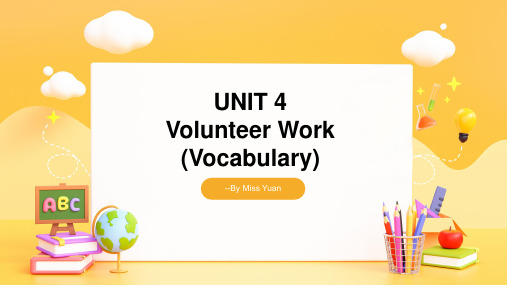
单词讲解
collect /kə’ lekt/ v.收集
例句
I used to collect stamps. 我过去曾经集邮。
8
单词讲解
contribute /kən’ trɪbju:t/ v.做出贡献
例句
How do you plan to contribute to our country? 你打算如何为我们国家做出贡献?
例句
It was a delightful rural scene. 那是赏心悦目的乡村风光。
25
单词解
university /ˌjuːnɪˈvɜːsəti/ n. 大学
例句
I hope all of you you can go to your ideal university next year. 我希望明年你们都能考上理想大学。
UNIT 4 Volunteer Work
(Vocabulary)
--By Miss Yuan
单词讲解
activity /æk’ tɪvəti/ n.活动
例句
It's a group activity. 这是一项集体活动。
2
单词讲解
amazing /ə’ meɪzɪŋ/ adj.令人惊奇的
例句
It' s pretty amazing. 这是相当惊人的。
5
单词讲解
architecture /’ ɑːkɪtektʃə(r)/ n.建筑
例句
You'll find this style of architecture all over the town. 全城到处可见这种风格的建筑。
6
单词讲解
英语2(基础模块)(第2版)Unit 4课件

The light rail is another effective and cheap means of transportation. And you needn’t worry about the traffic jam.
Ferry
You can take a ferry ride to your workplace and enjoy the beautiful view.
13. Read and write.
I have come back to China. From my photos you can see that I’ve been to many places in the States and I’ve tried different means of transportation. Here is a list:
Example
The light rail in Shanghai is comfortable.
cheap comfortable dangerous expensive safe fast slow ...
New York Shanghai Paris London the mountains the sea ...
Traffic jam in New York
10. Read and complete.
Fact file Name: Wang Lu Year of first visit to the U.S.: __1_9_9_7_____ Reason for first visit: _t_o_s_tu_d_y__in__a_u_n_iv_e_r_s_it_y Year of second visit to the U.S.: ___2_00_7_____ Reason for second visit: _f_or__a_b_u_s_in_e_s_s_t_r_ip_
基础模块第二册第四单元ppt课件
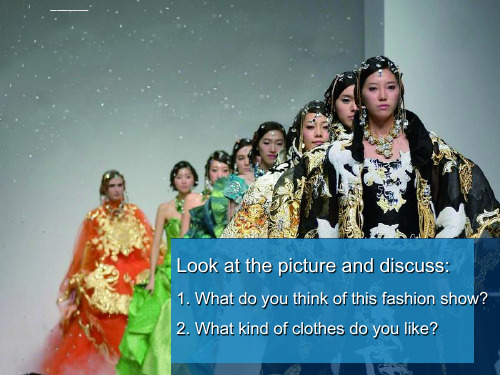
在 整 堂 课 的 教学中 ,刘教 师总是 让学生 带着问 题来学 习,而 问题的 设置具 有一定 的梯度 ,由浅 入深, 所提出 的问题 也很明 确
该句包含一个when引导的时间状语从句,attend a job interview:参加工作面试。
Listening and Speaking 在整堂课的教学中,刘教师总是让学生带着问题来学习,而问题的设置具有一定的梯度,由浅入深,所提出的问题也很明确
have a job interview.
Listening and Speaking 在整堂课的教学中,刘教师总是让学生带着问题来学习,而问题的设置具有一定的梯度,由浅入深,所提出的问题也很明确
4 Listen and practice. 听录音,练习谈论如何得体着装。
Betty: I’m going to my friend’s birthday party. I want to look classy and graceful. Could you give me some advice?
S1: Hi, S2. You look great today. This yellow sweater suits you rather nicely.
S2: Thank you. You look great, too. S1: Sweaters and jeans are my favorite. How about you? S2: You know, I like travelling, so casual style suits me best.
up
bracelet
手镯
Warming 在整堂课的教学中,刘教师总是让学生带着问题来学习,而问题的设置具有一定的梯度,由浅入深,所提出的问题也很明确
unit-_4职高英语基础模块2unit4PPT课件

15
16
Work in groups of four and brainstorm.
traffic jams in big cities
17
Read Wang Lu’s blog.
It has been ten years since I last came to New York. When I first came here to study in a university in 1997, everything seemed new and strange. It took me some time to learn the American way of living. I bought a second hand car when I found my first part-time job. It was exciting to drive for the first month, but later I got very tired of it. There were terrible traffic jams in rush hours.
Which city have you been to? What was the transportation like in that city? Did you take ... (subway / bus ...)? Which means of transportation did you like best / least?
13
Make a survey about the transportation in a city.
Student 1
Student’s name
Places he / she has been to
unit__4职高英语基础模块2unit4

train
欧姆龙贸易(上海)bu有s限公司
taxi
Discuss the means of transportation you have used.
plane
car
欧姆龙贸易(上海li)gh有t r限ail公司
ferry
Describe different means of transportation.
Have you ever ridden a horse? How about a motorcycle?
How many times have you traveled by airplane?
What kind of transportation do you use most often?
The transportation there is very convenient.
你骑过马吗?骑过摩托车吗? 你坐过几次飞机?
你经常使用哪种交通方式? 那里的交通很便利。
欧姆龙贸易(上海)有限公司
欧姆龙贸易(上海)有限公司
Work in groups of four and brainstorm.
traffic jams in big cities
欧姆龙贸易(上海)有限公司
Read Wang Lu’s blog.
I've tried all the means of transportation
我乘坐过各种交通工具
欧姆龙贸易(上海)有限公司
欧姆龙贸易(上海)有限公司
欧姆龙贸易(上海)有限公司
Discuss the means of transportation you have used.
subway
and light rails. Really? Did you take the light rail? Of course, the light rail was very
- 1、下载文档前请自行甄别文档内容的完整性,平台不提供额外的编辑、内容补充、找答案等附加服务。
- 2、"仅部分预览"的文档,不可在线预览部分如存在完整性等问题,可反馈申请退款(可完整预览的文档不适用该条件!)。
- 3、如文档侵犯您的权益,请联系客服反馈,我们会尽快为您处理(人工客服工作时间:9:00-18:30)。
Li Xiaohong: What is the transportation like in Beijing?
Make a survey about the transportation in a city.
Student 1 Student 2 Student 3 Student 4 Student 5
Student’s name
Places he / she has been to Means of transportation there
New York Shanghai Paris London the mountains the sea ...
Listen and tick.
ferry taxi train bus
subway plane
light rail boat
Listen again and answer the questions.
Sara’s Opinion
Subway
comfortable
Light rail
fast
Taxi
A bit expensive, but the service was very good.
Read aloud after the tape and underline.
Li Xiaohong: Hi, Bob! Did you go anywhere during the holiday? Bob: Yes. I have just come back from Beijing.
Read aloud after the tape and underline.
Bob: It’s good. The transportation in Beijing has changed a lot. There are more subways and light rails.
Li Xiaohong: Really? Did you take the light rail? Bob: Of course, the light rail was very comfortable.
How many times have you traveled by airplane?
你坐过几次飞机?
What kind of transportation do you use most often?
你经常使用哪种交通方式?
The transportation there is very convenient.
那里的交通很便利。
Work in groups of four and brainstorm.
traffic jams in big cities
Read Wang Lu’s blog.
It has been ten years since I last came to New York. When I first came here to study in a university in 1997, everything seemed new and strange. It took me some time to learn the American way of living. I bought a second hand car when I found my first part-time job. It was exciting to drive for the first month, but later I got very tired of it. There were terrible traffic jams in rush hours.
Li Xiaohong: Did you visit Tiananmen Square? Sara: Yeah! I went there by subway. It was very fast.
Make a survey about the transportation in a city.
Which city have you been to? What was the transportation like in that city? Did you take ... (subway / bus ...)? Which means of transportation did you like best / least?
1. How did Sara go to Shanghai? By train.
2. What place did she visit in Shanghai? Pudong.
Listen again and fill in the form.
Public Transportation in Shanghai
plane
car
light rail
ferry
Describe different means of transportation.
Example
The light rail in Shanghai is comfortable.
cheap comfortable dangerous expensive safe fast slow ...
Transportation he / she likes best
Transportation he / she likes least
Have you ever missed your last train or bus home?
你是否曾错过了最后一趟回 家的火车或公交车?
Have you ever riddeபைடு நூலகம் a horse? How about a motorcycle? 你骑过马吗?骑过摩托车吗?
I've tried all the means of transportation 我乘坐过各种交通工具
Discuss the means of transportation you have used.
subway
train
bus
taxi
Discuss the means of transportation you have used.
